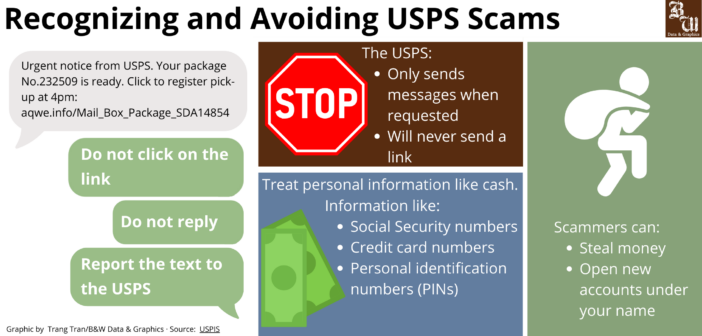When receiving a text or email that says it’s from a credible source such as the United States Postal Service or the IRS, some individuals’ first instinct might be to click on the link in an attempt to rectify whatever problem has apparently arisen. But doing so may now unknowingly take recipients to sites where their personal information is stolen or malware is loaded onto their device.
This text-based scam is called smishing, the email-based scheme is called phishing and students have become prime targets.
Scammers target individuals through messages that ask for personal and financial information. The message is made to look like it’s from a government agency, bank or other legitimate company.
U.S. Postal Inspector Michael Martel said the most common version of the scam is a fake link from the United States Postal Service that requests the individual pay a small fee to see where their package is or to change the delivery address.
Martel has been in the field of federal investigation for the last decade and described his current job as the “security arm” of the Postal Service.
“The Postal Service offers free tools to track specific packages, but customers have to provide a tracking number,” Martel said. “The Postal Service does not send unsolicited text messages to a customer without first requesting the service in the first place.”
For those who receive a text message or email with a link from the Postal Service, Martel advises them not to click on the link.
Sonia Trinkle, ‘25, said she was sent a smishing text when applying for an Irish passport to receive dual citizenship. The documents identifying her as an American citizen — her birth certificate and U.S. passport — were being sent to Ireland through the U.S. Postal Service.
“I got a text…saying that my document was unable to reach its desired endpoint, and I had so many important documents being shipped so it freaked me out,” Trinkle said. “(The link they sent) was a bunch of letters, so looking back on it now I should have known.”
Trinkle clicked on the link, and it took her to a page she said looked identical to the official U.S. Postal Service website. She was unable to enter the address for a P.O. box but instead prompted her to put in her personal home address so it could issue a return.
“When I first opened it I thought it was real to the point that I called (the U.S. Postal Service) and the Irish embassy,” Trinkle said. “I knew things like this happened, but it was always so obvious to tell it was a scam, and not that many people send physical mail anymore, so I didn’t even think that was something you can get scammed with.”
Martel said knowing how these scams work and how the Postal Service operates can help people protect themselves.
Individuals who are victims of these falsified Postal Service messages can report the smishing incident to their inspection service.
He said smishing is affecting the credibility of the Postal Service, and if people are skeptical of shipping their items because of the scam, the industry could lose business.
“That is exactly why fraudsters are using the Postal Service as their purported organization — because they are using the far-reaching reputation of (U.S. Postal Service)” Martel said.
Henry Vietor, ‘26, said he fell prey to phishing when he received an email from an address that was identical to his boss’ at his remote internship, and he was unable to confirm his boss’ identity.
Vietor said he nearly bought into the scam and almost sent the scammer $100 worth of Apple gift cards because it was difficult to tell the difference between his boss and the fraudster. He assumed his real boss would have followed up, but the boss never did.
“I had to do some serious self-reflection on how I handled myself online,” Vietor said. “I like to consider myself fairly tech savvy, so it was a bit of a wake-up call to fall victim to something that I would ordinarily dismiss as being easy to see through.”
After this experience, Vietor said he is far more wary of scams.
“I arrogantly assumed that I was smart enough to see through these sorts of things since the vast majority have clear indicators, however, scammers have clearly evolved,” Vietor said. “Now at this point, I am fairly adept at seeing through them.”
When it comes to scams in general, Martel said he has seen almost everything — from fake dating profiles to fake bosses.
He said even looking for an employment opportunity could lead to a potential scam.
“The golden rule still stands for a lot of schemes,” Martel said. “If it sounds too good to be true, then it more than likely is.”






Comment policy
Comments posted to The Brown and White website are reviewed by a moderator before being approved. Incendiary speech or harassing language, including comments targeted at individuals, may be deemed unacceptable and not published. Spam and other soliciting will also be declined.
The Brown and White also reserves the right to not publish entirely anonymous comments.
1 Comment
Is there a special place in hell for scammers of all sorts? I was hit by a scam where people disable your computer and the same people will fix it for an exorbitant fee which doesn’t seem so until later.